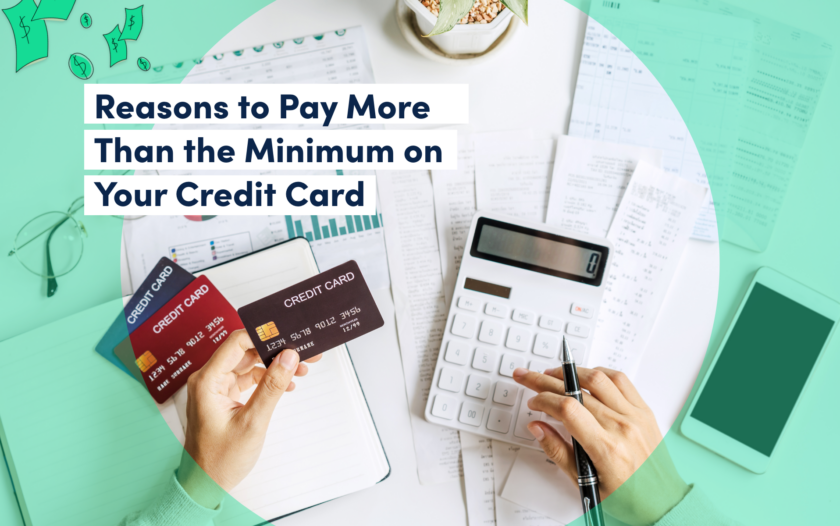6 Reasons to Pay More Than the Minimum on Your Credit Card
About Harrison
Harrison Pierce is a writer and a digital nomad, specializing in personal finance with a focus on credit cards. He is a graduate of the University of North Carolina at Chapel Hill with a major in sociology and is currently traveling the world.
Read full bio
At a Glance
Credit cards offer a convenient way to make purchases, but carrying a balance and paying only the minimum can lead to financial pitfalls. By paying more than the minimum on your credit card, you can reap a multitude of benefits that contribute to your overall financial health. Let’s explore six compelling reasons to pay more than the minimum on your credit card and provide practical tips to help you manage your credit wisely.
In this article, you’ll learn:
2.16%
The average interest rates on accounts with balances that accrued interest in May 2023.


You save money
One of the most compelling reasons to pay more than the minimum on your credit card is the potential for significant cost savings. Credit card interest rates can be substantial, and paying only the minimum prolongs the time it takes to clear your balance. By paying more, you’ll reduce the overall interest you accumulate, keeping more money in your pocket over the long term.
You can pay off your balance faster
When you pay more than the minimum, you accelerate the pace at which you pay off your credit card debt. This allows you to become debt-free sooner, giving you greater financial freedom and reducing the stress of carrying a balance.
You can reduce your credit utilization ratio
Your credit utilization ratio, the amount of credit you’re using compared to your credit limit, significantly impacts your credit score. By paying more than the minimum, you lower your credit utilization ratio, which can positively influence your credit score and enhance your borrowing potential.
Related: How to Lower Your Credit Utilization Ratio?
It helps improve your credit score
Consistently paying more than the minimum reflects responsible credit management and demonstrates your ability to handle debt. This practice can lead to an improved credit score over time, opening doors to better interest rates on loans, mortgages, and other credit-related transactions.
It helps you prepare for a larger loan
A strong credit history is essential if you want to apply for a larger loan, like a mortgage or a car loan. Paying more than the minimum on your credit card showcases your commitment to financial responsibility, which can make a positive impression on lenders when you seek a larger loan.
It can reduce your interest rate
Some credit card companies offer incentives for responsible credit management, like lower interest rates for cardholders who consistently make more than the minimum payment. By taking advantage of these opportunities, you can further reduce the cost of borrowing and manage your credit more efficiently.
Tips to pay more than your minimum credit limit
1. Check your statement balance
Understanding your current credit card balance is crucial for determining how much extra you can afford to pay each month.
2. Create a budget
Establish a comprehensive budget that outlines your income, expenses, and discretionary spending. This helps you identify areas where you can allocate additional funds to pay off your credit card.
3. Increase your budget margin
Look for opportunities to cut unnecessary expenses and redirect those funds toward your credit card payments.
4. Consider avalanche method
Prioritize paying off the credit card with the highest interest rate first, then tackle the others in descending order. Avalanche method saves you more money on interest in the long run.
5. Snowball method
Alternatively, start by paying off the credit card with the lowest balance. Once that’s cleared, move on to the next lowest balance. Snowball approach provides a sense of accomplishment and motivation as you eliminate smaller debts.
Other ways to pay off credit card debt
1. Debt consolidation
Combining multiple debts into a single loan or credit line can simplify payments and potentially offer a lower interest rate.
2. Balance transfer
Transferring high-interest credit card debt to a card with a lower or zero introductory interest rate can help you save on interest.
3. Debt management plan
Enrolling in a debt management plan through a credit counseling agency can provide structured repayment and potentially negotiate lower interest rates with your creditors.
FAQs
Paying the full balance is ideal, but if that’s not possible, paying more than the minimum is strongly recommended to save on interest and improve your credit profile.
Yes, most credit card issuers allow you to pay more than the minimum. This practice is encouraged for better financial management.
Paying only the minimum extends the time it takes to repay your debt, leading to higher overall interest costs.
While making the minimum payment won’t directly harm your credit score, it may limit its growth potential. Paying more than the minimum demonstrates responsible credit usage and can positively impact your score over time.









